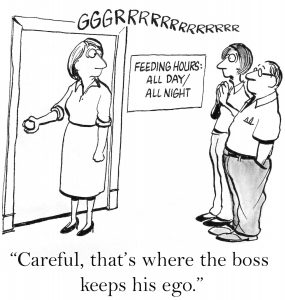Does Your Company Have an Ego Problem?
Executive Suite
By Steve Margalit, FPC Recruitment Training Consultant
For those of us who have been involved in the process of recruiting and hiring, we know it can be a very humbling experience. Reflect back on some failed attempts at securing your prized candidate and you might find some obvious reasons why you couldn’t close the deal, Top 3 Reasons Why You’re Losing Your Best Candidates. Here are a few of the usual suspects:
- Compensation – your competitor’s compensation plan was more aggressive than yours
- Timing – either you interviewed a candidate late in their search process, or YOU took too long to keep their interest and seal the deal
- Relocation – your company didn’t offer a competitive enough relocation package to attract top, out-of-town talent
- Career Path – during the interview, there wasn’t an attractive enough career path/trajectory to entice the candidate to quit their current job
One reason that may not be nearly as obvious to you is that your company’s big ego has been getting in the way. Ego by definition is “an inflated feeling of pride in your superiority to others”. It’s great to be proud and confident in the company you work for, but it’s equally important to be self-aware and realize yours isn’t the only opportunity in town. We are in a highly competitive marketplace and it is imperative to be tuned in to presenting the position at your company as the best career move for every candidate that walks in the door. If any of these examples strike a nerve, your company may have an ego problem:
- Undefined hiring process – there isn’t enough emphasis placed on building a process to impress the candidate and show him/her that the team has it’s stuff together
- Hiring managers are not active participants in the process – their connection with the candidate can really help generate interest and prove that new talent acquisition is vital to the success of the company
- The belief that recruiting isn’t competitive – more so than ever before, there is another company down the block competing for the same top talent as you
- Fail to address ‘what’s in it for them’ (WIIFT) – interviewing is a two way street and it’s just as important to articulate what the opportunity will offer the applicant as it is to grill them about their experience
- The company’s compensation structure is the only one that seems to exist – in this day and age, it is imperative that you have the flexibility to get creative with offers to entice a star to join your team-Some suggestions include six-month reviews, guaranteed percentage of first year’s bonus and complementary career search services for a trailing spouse
- Recruiting fees are perceived as a cost and not an investment – using professional recruiters to identify and hire the best talent serves as an investment in your company’s future not a tax on growth
So, how do we solve these issues? First, it’s important to remember that whether your organization is large or small, has a name brand or not, you need to “sell” your company and the position for which you are hiring. “My best clients are the ones that recognize the need to act decisively and put together strong offers to land their choice candidates in this highly competitive market.” – Cathy McIsaac, FPC of Arlington Heights. Start by understanding that every interaction with the job seeker is important. From the very beginning, the candidate is forming an opinion about your company and whether or not he/she wants to work there. Next, at the interview stage, provide your executive recruiter with a well-defined, branded agenda to share with the candidate. Make sure all interviewers, particularly the hiring managers, are fully prepared and on the same page. If they aren’t, it could be a big turn-off and can have a negative impact on the candidate’s opinion of the company. Remember that interviewing is a two-way street – listen to the candidate, allow them to ask questions. If your interview process has multiple levels, leverage your executive recruiter’s relationship with the candidate to dictate the timing of subsequent interviews. The strongest candidates WILL get hired quickly by someone; be prepared to act immediately if you want your offer to be considered.
In summary, invest the appropriate amount of time to develop a process that impresses candidates every step of the way, check your ego at the door, and understand that we are in a ‘quality candidate’ poor market. These relatively simple steps will help your closing rate to increase tremendously. Good luck, and let us know how we can help.
ABOUT FPC
FPC is an executive search firm comprised of over 65 offices nationwide that specialize in placing middle and executive management professionals. FPC National surveys professionals to gain better insights on workplace and job hunting trends.


